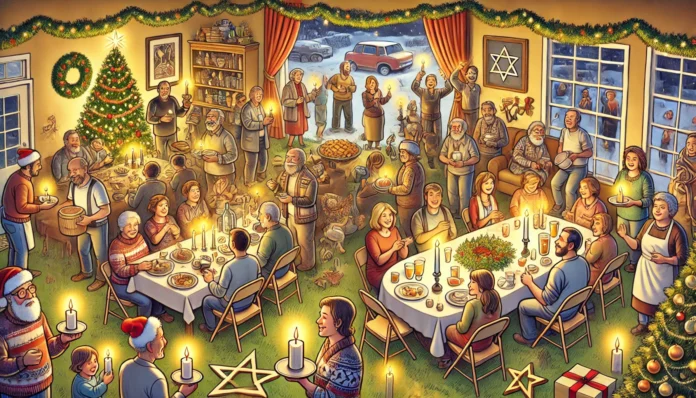Celebrating Holidays as an Atheist: Creating Secular Traditions
For many, holidays are a time of joy, reflection, and togetherness. Yet, for atheists and other nonbelievers, traditional celebrations can sometimes feel alienating due to their religious origins. The good news is that holidays can be just as meaningful—if not more so—when celebrated from a secular perspective. By creating new traditions or adapting existing ones, atheists can enjoy the festive season while staying true to their values. This article explores how nonbelievers can celebrate holidays in meaningful, secular ways, offering practical ideas and resources for building inclusive, joyful traditions.
Why Celebrate Holidays as an Atheist?
Holidays are more than religious observances; they are cultural touchstones that bring people together, foster community, and mark the passage of time. Celebrating holidays can help reinforce shared values, strengthen relationships, and provide opportunities for reflection and gratitude. For atheists, the challenge is to find or create traditions that resonate with their worldview—one grounded in reason, compassion, and human connection.
Adapting Traditional Holidays: Secular Approaches
Many traditional holidays have deep religious roots, but their core themes—family, generosity, renewal—are universal. Here’s how atheists can reinterpret some of the world’s most popular holidays:
Secular Christmas
Christmas is often associated with Christian beliefs, but its modern celebration is a blend of pagan, Christian, and secular customs. Atheists can focus on the aspects of Christmas that emphasize togetherness, generosity, and joy. Consider:
- Gift-Giving: Celebrate the spirit of giving without religious overtones. Support local artisans or donate to secular charities.
- Decorating: Enjoy the beauty of lights, trees, and festive décor as symbols of hope and warmth during the winter months.
- Secular Carols: Sing songs that celebrate winter, friendship, and goodwill. Many classic carols have nonreligious versions or alternatives.
Diwali Without Deities
Diwali, the festival of lights, is celebrated by millions worldwide. While it has religious significance in Hinduism, its core themes—light over darkness, knowledge over ignorance—are universal. Atheists can:
- Light candles or diyas to symbolize hope and enlightenment.
- Host a feast with friends and family, focusing on gratitude and togetherness.
- Share stories of personal growth and overcoming challenges.
Thanksgiving: Gratitude Without Religion
Thanksgiving is an opportunity to express gratitude and connect with loved ones. Atheists can:
- Share what they’re thankful for, focusing on people, experiences, and achievements.
- Volunteer at local shelters or food banks, emphasizing community service.
- Prepare a meal together, making it a celebration of cooperation and friendship.
Other Holidays: From Easter to Ramadan
Even holidays with strong religious associations can be reimagined. For example, Easter can become a celebration of spring and renewal, with egg hunts and outdoor activities. During Ramadan, nonbelievers can join friends for iftar meals, focusing on solidarity and cultural exchange.
Creating New Secular Traditions
Many atheists and humanists have developed their own holidays and ceremonies. Here are some ideas for creating new traditions:
Humanist Ceremonies
Humanist celebrants offer nonreligious ceremonies for life’s milestones—weddings, funerals, baby namings, and more. These ceremonies focus on the values and stories of the individuals involved.
Festivus and Other Invented Holidays
Some nonbelievers embrace invented holidays like Festivus (popularized by Seinfeld) as a playful way to gather and celebrate. The key is to create rituals that are fun, inclusive, and meaningful to your group.
Solstice and Equinox Celebrations
Marking the changing of the seasons is a tradition that predates organized religion. Many atheists celebrate the winter and summer solstices or the spring and autumn equinoxes with gatherings, feasts, and outdoor activities. These events can be a time to reflect on nature, science, and our place in the universe.
Tips for Building Your Own Secular Traditions
- Focus on Values: Identify the values you want to celebrate—kindness, gratitude, curiosity, etc.—and build rituals around them.
- Be Inclusive: Invite friends and family of all beliefs to join in. Emphasize shared humanity over differences.
- Get Creative: Invent new games, recipes, or activities that reflect your interests and values.
- Document Your Traditions: Keep a journal or photo album to record your celebrations and watch your traditions evolve over time.
Embracing the Holidays—Your Way
Ultimately, holidays are what you make of them. Whether you’re adapting old traditions or inventing new ones, the most important thing is to celebrate in ways that feel authentic and joyful. By focusing on shared values, creativity, and community, atheists can make the holiday season a time of genuine connection and meaning—no faith required.

